
Despite its name, “sports medicine” is not a specialty that is limited to treating athletes or repairing injuries suffered on the court or playing field. Sports medicine can be beneficial – if not indispensable – for all sorts of people who have all sorts of injuries from all sorts of activities.
Here are five reasons you may want to schedule an appointment with a board-certified sports medicine physician:
1. You have an acute sports injury.
The most common reason people see a sports medicine doctor is because they recently suffered a sudden, acute injury to a bone, muscle, or ligament while engaging in sports, exercise, or even basic activities like walking. Sprains and strains, broken or fractured bones, knee or back injuries, and dislocated joints are all examples of acute injuries
2. You have a chronic sports injury.
As opposed to acute sports injuries, which happen suddenly in response to trauma, chronic injuries are ones that develop over time. Chronic sports injuries are often the result of overuse and exercising longer and harder than your muscles and bones can reasonably handle. A common example is a rotator cuff injury, swollen tendons, and stress fractures.
3. You need orthopedic surgery.
While not all sports medicine doctors are surgeons, many sports injuries require surgery or minimally invasive surgical procedures. OrthoMiami’s Dr. Cesar E. Ceballos is Board Certified in both Orthopedic Surgery and Sports Medicine by the American Board of Orthopaedic Surgery, making him particularly well-suited to address serious injuries and conditions for which surgery is the best or only option.
4. You’re recovering from a sports injury.
A sports medicine doctor not only repairs injuries, but they play a critical role in helping patients recover and regain the performance and function they had before their injury. Your doctor will prescribe a recovery regimen that can include medications, physical therapy, splints or supports, range of motion exercises, and a host of other treatments designed to ensure a fast but lasting recovery.
5. You want to prevent another sports injury.
Prevention is part of sports medicine as much as treatment is, especially if you are starting a new sport, activity, or exercise routine. If you schedule a visit with a sports medicine doctor before you embark on a new physical activity you plan on investing a lot of time and effort in, your doctor may:
- Conduct a physical exam to make sure the activity is safe for you
- Recommend a conditioning and exercise program to get you fit for the activity
- Provide advice about safe training and equipment
- Give you nutrition and healthy lifestyle advice
- Suggest a program of warm-up, stretching, and cool-down routines
Schedule an Appointment at OrthoMiami Today To Learn More About How Sports Medicine Can Help You Stay In The Game.
At OrthoMiami, we work with athletes and sports-minded patients every day. We know how badly they want to get back to the activities they love after they’ve suffered an injury. That is why we are committed to using the most advanced and effective methods to relieve pain and restore mobility to patients as quickly as possible. The OrthoMiami team always welcomes new patients and can generally schedule new patient appointments within a couple of days. Please contact us today at (305) 596-2828 to schedule your appointment. We look forward to meeting you.